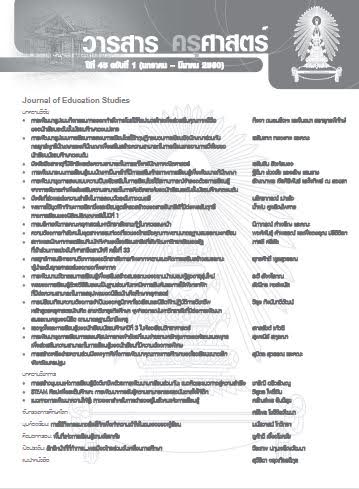ปัจจัยเชิงสาเหตุที่มีอิทธิพลต่อความสามารถในการแก้โจทย์ปัญหาคณิตศาสตร์
Keywords:
ปัจจัยเชิงสาเหตุ, มีอิทธิพล, โจทย์ปัญหาคณิตศาสตร์, ความสามารถ, CAUSAL FACTORS, INFLUENCE, MATHEMATICS PROBLEMS, ABILITYAbstract
การวิจัยนี้มีวัตถุประสงค์เพื่อ 1) ศึกษาปัจจัยเชิงสาเหตุที่มีอิทธิพลต่อความสามารถในการแก้โจทย์ปัญหาคณิตศาสตร์ 2) วิเคราะห์ตัวแบบปัจจัยเชิงสาเหตุที่มีอิทธิพลต่อความสามารถในการแก้โจทย์ปัญหาคณิตศาสตร์ 3) พัฒนาตัวแบบปัจจัยเชิงสาเหตุที่มีอิทธิพลต่อความสามารถในการแก้โจทย์ปัญหาคณิตศาสตร์กลุ่มตัวอย่างในการวิจัยเป็นนักศึกษาชั้นปีที่ 1 ของมหาวิทยาลัยธุรกิจบัณฑิตย์ ปีการศึกษา 2557 จำนวน 337 คน ใช้วิธีการเลือกตัวอย่างแบบสุ่มอย่างง่าย มีตัวแปรแฝงภายนอกที่ใช้ในการวิจัยทั้งหมด 7 ตัวแปร ได้แก่ พฤติกรรมการสอนของผู้สอน การรับรู้ความสามารถของตนเอง ความภาคภูมิใจในตนเอง แรงจูงใจใฝ่สัมฤทธิ์ เจตคติ ความตั้งใจเรียนและความสามารถในการแก้โจทย์ปัญหาคณิตศาสตร์ เครื่องมือในการวิจัยครั้งนี้ประกอบด้วยแบบทดสอบคณิตศาสตร์จำนวน 1 ฉบับ และแบบวัดจำนวน 6 ฉบับ วิเคราะห์ข้อมูลด้วยโปรแกรม SPSS 17.0 เพื่อหาค่าสถิติพื้นฐาน วิเคราะห์ตัวแบบปัจจัยเชิงสาเหตุด้วยโปรแกรมลิสเรล (LISREL 8.7) ผลการวิจัยพบว่า 1) ตัวแปรพฤติกรรมการสอนของผู้สอนและความตั้งใจเรียนมีอิทธิพลอยู่ในระดับมาก ตัวแปรการรับรู้ความสามารถของตนเอง ความภาคภูมิใจในตนเอง แรงจูงใจใฝ่สัมฤทธิ์และเจตคติต่อวิชาคณิตศาสตร์ มีอิทธิพลอยู่ในระดับปานกลาง 2) ตัวแบบปัจจัยเชิงสาเหตุกับความสามารถในการแก้โจทย์ปัญหาคณิตศาสตร์มีความสอดคล้องกับข้อมูลเชิงประจักษ์ โดยตรวจสอบจากค่าไคกำลังสองได้ 122.159 ค่าองศาเสรี 150 มีค่าพี 0.954 ค่าดัชนีความสอดคล้องของตัวแบบ (GFI) เท่ากับ 0.970 ค่าดัชนีวัดระดับความสอดคลองเปรียบเทียบ (CFI) เท่ากับ 1.000 ค่าดัชนีรากของคาเฉลี่ยกําลังสองของสวนเหลือมาตรฐาน (RMR) 0.026 ค่าดัชนีความคลาดเคลื่อนในการประมาณคาพารามิเตอร (RMSEA) เท่ากับ 0.000 และค่าดัชนีตรวจสอบความกลมกลืน (NFI) เท่ากับ 0.980 ตัวแบบสามารถอธิบายความสามารถในการแก้โจทย์ปัญหาคณิตศาสตร์ได้ร้อยละ 97.00 3) ตัวแปรที่มีอิทธิพลทางตรงและทางอ้อมเชิงบวกต่อความสามารถในการแก้โจทย์ปัญหาคณิตศาสตร์ อย่างมีนัยสำคัญทางสถิติเรียงตามลำดับ คือ พฤติกรรมการสอนของผู้สอน ความภาคภูมิใจในตนเอง เจตคติ แรงจูงใจใฝ่สัมฤทธิ์ การรับรู้ความสามารถของตนเองและความตั้งใจเรียน มีอิทธิพลรวมเท่ากับ 1.568 1.421 0.946 0.488 0.404 0.232 ตามลำดับ ตัวแปรที่มีอิทธิพลทางตรงเชิงบวกต่อความสามารถในแก้โจทย์ปัญหาคณิตศาสตร์ ได้แก่ พฤติกรรมการสอนของผู้สอน ความภาคภูมิใจในตนเอง เจตคติ ความตั้งใจเรียน โดยมีอิทธิพลเท่ากับ 1.076 1.072 0.893 0.232 ตามลำดับ ตัวแปรที่มีอิทธิพลทางอ้อมเชิงบวกต่อความสามารถในการแก้โจทย์ปัญหาคณิตศาสตร์ ได้แก่ แรงจูงใจใฝ่สัมฤทธิ์ การรับรู้ความสามารถของตนเอง โดยมีอิทธิพลเท่ากับ 0.488 0.404 ตามลำดับ
The objectives of this research were 1) to study the effects of various factors on mathematical problem solving ability, 2) to analyze a hypothetical model of causal factors influencing mathematical problem solving ability and 3) to develop an appropriate model for mathematical problem solving ability. The sample consisted of 337 first-year undergraduates at Dhurakij Pundit University in the 2015 academic year derived through simple random sampling. There were sevem exogenous variable used in this research : teaching behavior, self-efficacy, self-esteem, achievement motivation, attitude, attention and mathematical problem solving ability. The research instruments consisted of 1 mathematics test and 6 measurement tests for teaching behavior, self-efficacy, self-esteem, achievement motivation, attitude and attention. Statistics SPSS 17.0 was used for data analysis of basic statistics and LISREL 8.70 was used for SEM to analyze the causal factor influence model. It was found that 1) the teaching behavior variable and attention to study was at a highly influential level, self-efficacy variable, self-esteem, while achievement motivation and attitude were at the medium influential level; 2) the hypothetical model of causal factors influencing academic achievement of undergraduate students at Dhurakij Pundit University were in agreement with the empirical data, demonstrated by the following statistics: chi-square test=122.159, degree of freedom=150, p-values=0.954, GFI=0.970, CFI=1.000, RMR=0.026, RMSEA=0.000, NFI=0.980 and 0.97 for multiple correlation of determination. All of these variables could explain the 97% of mathematical problem solving ability; and 3) the variables which significantly influenced student mathematical problem solving ability both directly and indirectly were instructor teaching behavior, student self-esteem, attitude, achievement motivation, self-efficacy, and attention, demonstrated by the total effects at 1.568 1.421 0.946 0.488 0.404 and 0.232, respectively. The variables which only directly influenced the student mathematical problem solving ability were the instructor teaching behavior, self-esteem, attitude and attendance, shown by the effects at 1.076 1.072 0.893 and 0.232, respectively. The only variable which indirectly influenced were achievement motivation and self-efficacy, demonstrated by the indirect effect of 0.488 and 0.404, respectively.




